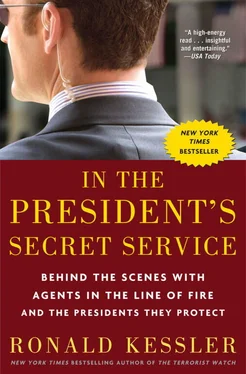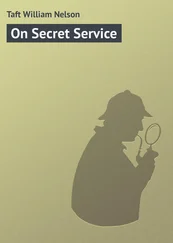“It didn’t take long for him to realize that he could leave fairly early on Friday, come back late Sunday,” an agent who was on his detail says. “And then it didn’t take long much past that to realize that he could get there early Friday, leave Monday morning, and make it to work on time. So it became Friday, Saturday, Sunday, and Monday.”
Snow resigned in June 2006. By then, “He would leave on Thursdays, come back on Monday,” an agent remembers. “So that makes five days in Richmond. And he was going every weekend.”
“I think he legitimately liked Richmond,” says an agent. “He had a nice place on the river with a nice big pool. But you’ve got six or seven guys on the detail, he’s spending four or five days a week in Richmond. You do the numbers, and you’re running out of bodies pretty quick to cover that.”
Snow’s wife rarely came to Washington and seemed to despise the agents.
When Snow was in town, she expected agents to bring in the mail and the newspaper. The mail was not screened, and agents are not supposed to perform personal errands. While some agents did so as favors, most did not.
One Sunday, Snow’s wife came out in her bathrobe and asked an agent, “Why don’t you deliver the paper?”
“It’s not my job to deliver your paper; you can get your own paper,” the agent responded.
“That didn’t go over too well,” the former agent says. “I was there to keep the secretary unharmed—as well as her, if possible—but I most certainly was not her paper boy.”
“Nothing amazes me anymore, but apparently she [Snow’s wife] didn’t suspect anything,” an agent says. “It was going on the entire time he was under our protection, and it was obviously going on prior to that. It was just more convenient with us around.”
The agents say there was one close call. One Sunday when Snow was with his alleged mistress, her husband came home from church early.
“One of our agents saw what was happening,” says an agent. “To his credit, he got out of his vehicle and started making as much noise as he could.” Loudly, the agent called out the husband’s name and said to him, “Hey, great to see you.” The agent slammed the doors of his Suburban. As the husband was walking into his house, Snow came out, his hair messed up.
What infuriated the agents was the way Snow seemed to think he was pulling the wool over their eyes. On one occasion, Snow said he wanted to go for a walk.
“He gets into the car, and we take off, and he says, ‘Go down this road down here,’ which was a dead end with a museum at the end. Well, we get down there, and she’s [the alleged mistress] down there with the hood of her car up.”
Snow said, “Oh, looky here! What’s happened here?”
Saying her car had broken down, the woman asked for jumper cables to help charge the battery. Sensing a ruse, one of the agents suggested they try starting the car first. Snow insisted that would not work. After the jumper cables were attached, the car started without any hesitation.
“We better follow her home, just to make sure the car doesn’t cut off again,” Snow said.
“So we get her home, and he’s there for about an hour, hour and a half,” an agent says.
“He thought we weren’t smart enough to realize what was going on,” another agent says. “That’s what really drove a lot of guys crazy.”
In denying that Snow had an affair with Area 51, Snow’s lawyer Cullen put the author in touch with Tom Greenaway the leader of Snow’s detail for the first half of his term. Greenaway said that the woman in question was not Snow’s mistress.
“I was with him fifteen hours a day, sometimes twenty-five days a month,” Greenaway said.
As it turns out, Greenaway became a golfing buddy of Snow’s while he was protecting him. That is considered a no-no in the Secret Service because a personal friendship could lead an agent to do favors beyond his duties or to back down on security issues. In addition, agents who become friends with top protectees may start trying to push their weight around with their bosses.
In response to a question, Greenaway acknowledged that the Secret Service tried to give him what he called a “punitive” transfer after he had a disagreement with management. He confirmed that Snow intervened with the Secret Service director to delay any transfer off Snow’s detail for several months until after the 2004 election. Greenaway said he then retired.
Cullen said neither Snow nor his family “improperly used the services of the U.S. Secret Service detail assigned to him. The Secret Service is required to protect the secretary of the treasury” Cullen said. “Protection is mandatory. It is not discretionary. Nor is it assigned on the basis of a threat assessment for a particular event or trip.”
Cullen said that Snow considers Secret Service agents “professional, brave, and extremely hard-working.” While Snow is “surprised and saddened that a former Secret Service agent would be a source of any information—particularly anonymous, erroneous information—going into a book, he believes that the honor and historic tradition of the Secret Service will remain intact, and he recalls with great fondness and affection the brave members of his detail,” the lawyer said.
In view of that, the lawyer said, Snow is “surprised that you would imply in your book that he had asked or demanded that his detail ever deviate from their proper role.”
Snow’s lawyer is correct in saying that the treasury secretary, along with others in the line of succession to the presidency, is required to have Secret Service protection when the secretary of homeland security authorizes it. But he is wrong in saying that the book suggests that Snow asked that his detail deviate from their proper role.
If a government official under protection decides to travel from Washington every weekend to see his mistress or his wife or to take in a movie, the Secret Service is required to provide protection. The question is whether the protectee should be taking such trips knowing that taxpayers are footing the bill.
27

Renegade
THE SECRET SERVICE began protecting Barack Obama on May 3 , 2007, eighteen months before votes for president were to be cast. It was the earliest point at which the Secret Service had ever protected a presidential candidate. In contrast, in the 2004 election, John Kerry and John Edwards began receiving protection in February of that year, eight months before the general election. Michelle Obama began receiving protection on February 2, 2008. It would turn out to be the longest and most demanding presidential campaign in history.
Strapped for agents and facing rising attrition rates, the Secret Service began planning for the campaign in January 2005. In February of that year, the service asked most of its 3,404 agents for their preferences on types of candidate protection assignments. For example, agents can ask to join a general protection shift, operations and logistics, or transportation details. Agents were given special training at the Rowley center so that members of each detail to be assigned to a future candidate would get used to working together. Agents who would drive candidates were given refresher courses. The campaign also would require the support of twelve hundred Uniformed Division officers.
By law, the Secret Service provides protection of major presidential and vice presidential candidates and their spouses. The secretary of homeland security determines who the major candidates are after consulting with an advisory committee consisting of the speaker and minority leader of the House, the majority and minority leaders of the Senate, and one additional member selected by the other members of the committee.
Читать дальше













